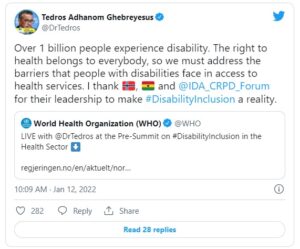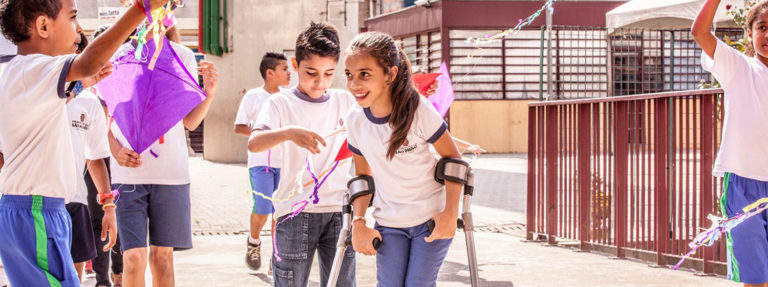Image Credits: clipper round the world.
Health Equity
12/01/2022
Aishwarya Tendolkar
Health Policy Watch
People with disabilities have been some of the biggest silent sufferers in the COVID-19 pandemic, according to speakers at the Pre-Summit of the Global Disability Summit 2022 on Wednesday.
“Now, more than ever, if we want to be ready for a new pandemic, we need to ensure that disability inclusion in the health sector becomes a reality,” said Yannis Vardakastanis, President of the International Disability Alliance. “Nothing about us, without us.”
This pre-summit was co-hosted by the governments of Norway and Ghana and the International Disability Alliance, in collaboration with the World Health Organization (WHO) ahead of the summit on 16-17 February, which is expected to see participants commit to the inclusion of disabilities in the health sector.
“In many low and middle-income countries, persons with disabilities are among the most marginalized people in the world. They are also often the last to gain access to health care,” the Prime Minister of Norway Jonas Gahr Støre said.
He added that while poverty and disabilities are mutually reinforcing, the pandemic has only compounded the situation more for the marginalised communities. “We must take steps to safeguard the health and well being of persons with disabilities including mental health.”
Over a billion people suffer from disabilities
WHO Director-General Dr Tedros Adhanom Ghebreyesus highlighted at the pre-summit that the way individuals with disabilities suffered during the pandemic was “unacceptable”, particularly considering that over a billion people in the world have some form of disability.
“Recognizing what needs to be done is only the first step; the second step is committing to building a disability-inclusive health sector,” he said. He added that such inclusion makes it easier for people with disabilities to access the health services they need and work with other sectors to foster greater inclusion in society more broadly.
The conversation at this pre-summit was more around making the health sector more inclusive. This is in tandem with the adoption of a landmark World Health Assembly resolution on achieving the highest attainable standard on health for persons with disabilities in January 2021. The resolution called on countries and health sector partners to move away from an exclusively medical approach to disability towards adopting a comprehensive people-centred and human rights-based approach.
 Females With Disabilities Are More Affected
Females With Disabilities Are More Affected
According to Dr Natalia Kanem, Executive Director of the United Nations Population Fund, nearly one-fifth of women have disabilities, and these women are up to 10-times more likely to experience gender-based violence.
Kanem said that for women and girls with disabilities, the right to health is not just about being able to obtain health services without judgment or discrimination also about the right to make their own decisions about their own bodies and sexuality, free from coercion or violence.
Healthcare Inclusion is a privilege for many
People with disabilities and rehabilitation need more attention and have different needs but the country’s healthcare system and its recognition of these needs matters.
“Rehabilitation often does not have high priority within the health systems,” said Dr Tom Shakespeare, Professor of Disability Research at the London School of Hygiene and Tropical Medicine.
He believes this is because it is seen as “less attractive” by funders due to the nature of rehabilitation being enabling a better life rather than curing.
He said that his condition of dwarfism was recognised in the UK and it enabled him to get free vaccination and booster shots for COVID-19, but those with intellectual disabilities may have lost out on this and perished.
“Globally, many people both with my condition, and many, many others don’t have access to needed health care or rehabilitation. And that violates article 25 of the Convention on the Rights of Persons with Disabilities,” said Shakespeare.
Israel has tried to make its hospitals more inclusive during the pandemic which is in accordance with legal obligations in the country to make medical services accessible at all levels, said Nitzan Horowitz, Israel’s Minister of Health.
He added that information was presented in sign language, transparent masks were worn at hospitals so that people with hearing difficulties were able to understand and communicate with their physicians.
However, that is not the case in many countries which do not prioritise or include disabilities in all aspects. Individuals with disabilities need to be included at the table while policies are being designed.
“If a health system is not inclusive and accessible for people with disabilities prior to a crisis, it’s not likely to be enough when a crisis hits,” said Robert Mardini, Director-General, International Committee of the Red Cross.




